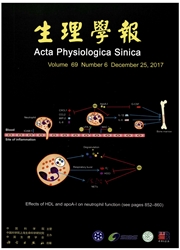

 中文摘要:
中文摘要:
创伤引起的继发性心脏损伤(trauma-induced secondary cardiac injury,TISCI)是创伤致死的重要原因。本研究组前期研究观察到创伤可以导致心肌细胞凋亡和继发性心功能受损,但具体机制不清。本研究旨在观察创伤时心肌细胞凋亡发生的时间规律,并探讨创伤导致心肌细胞凋亡的可能途径。采用Noble-Collip鼓制备创伤大鼠模型;利用创伤后血清培养正常大鼠心肌细胞48 h。在不同时间点检测心肌细胞凋亡、心脏功能及凋亡相关蛋白酶caspase-3、-8、-9和-12。结果显示,继发性心功能受损出现在创伤后24 h,而创伤大鼠心肌凋亡指数和caspase-3活性均在创伤后6 h就显著增加,12 h达峰值。大鼠心肌组织caspase-12(介导内质网应激反应性凋亡途径)活性和表达在创伤后3 h出现明显升高,6 h达峰值;而心肌组织caspase-8(介导外源性凋亡途径)和caspase-9(介导内源性凋亡途径)均于创伤后24 h激活。同时,采用创伤血清培养正常大鼠心肌细胞,结果同样显示,创伤血清可以引起正常大鼠心肌细胞caspase-3活性显著增加,且心肌细胞caspase-12的活化早于caspase-3、-8和-9的激活;给予caspase-12特异性抑制剂Z-ATAD-FMK处理后,创伤血清引起的心肌细胞凋亡显著降低。此外,创伤后6 h心肌组织caspase-12活性的增高与创伤后24 h继发性心功能减低呈现显著的负相关。本研究表明,在TISCI时caspase-12最早激活,且激活的caspase-12是创伤所致心肌细胞凋亡的重要原因,因此抑制caspase-12介导的细胞凋亡有望成为减轻TISCI的新举措。
 英文摘要:
英文摘要:
Trauma-induced secondary cardiac injury (TISCI) is associated with increased adverse cardiac events and death. We have previously reported that TISCI results in myocardial apoptosis and secondary cardiac dysfunction. However, the underlying mechanism is unclear. To identify the time course of trauma-induced cardiomyocyte apoptosis and possible apoptotic pathway, traumatic rat models were built with Noble-Collip drum. Meanwhile, normal rat cardiomyocytes were cultured with traumatic plasma (TP) for 48 h. Cardiomyocyte apoptosis, cardiac function and the apoptosis related enzymes, including caspase-3, -8, -9, and -12, were determined. The results showed that there was no direct injury of rat hearts immediately after trauma. However, compared with hearts from the sham rats, hearts isolated from traumatic rats exhibited reduced +dP/dTmax and -dP/dTmax 24 h after trauma. In traumatic rats, myocardial apoptotic index and caspase-3 activity obviously increased 6 h after trauma, and achieved the maximal value 12 h after trauma. The activity and expression of caspase-12, an endoplasmic reticulum (ER) stress-specific caspase, elevated markedly 3 h after trauma and reached its peak 6 h after trauma. Otherwise, caspase-8 (extrinsic apoptotic pathway) and caspase-9 (intrinsic apoptotic pathway) in the myocardial tissue of traumatic rats were activated 24 h after trauma. Meanwhile, incubation of normal rat cardiomyocytes with TP increased caspase-12 activity at 6 h, caspase-3 activity at 12 h, caspase-8 and -9 activities at 24 h, respectively. TP-induced cardio- myocyte apoptosis was virtually abolished by Z-ATAD-FMK (a caspase-12 specific inhibitor). In addition, there was a significant neg- ative correlation between myocardial caspase-12 activity and trauma-induced secondary cardiac dysfunction. Our present study demonstrated that caspase-12 is firstly activated and plays an important role in TISCI rats. Inhibition of caspase-12 mediated apoptosis may be a novel strategy in ameliorating posttraumati
 同期刊论文项目
同期刊论文项目
 同项目期刊论文
同项目期刊论文
 期刊信息
期刊信息
